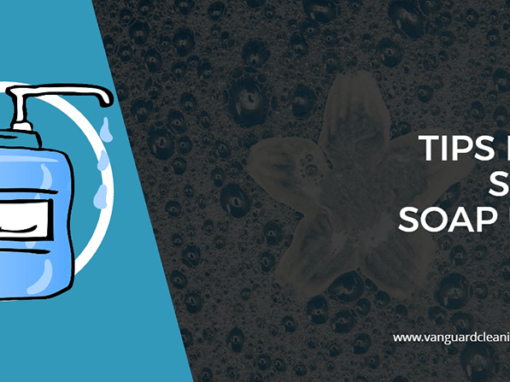Vanguard Cleaning Systems

Touchless Soap Dispensers
Touchless soap dispensers in business restrooms help stop the spread of bacteria and disease.
Not all soaps are created equal and may behave in an unexpected manner.
Regular, non-antiseptic soap does not kill germs and bacteria, it ‘encapsulates’ the microbe, which is then washed away with water-hence the recommendation to rinse and dry your hands down and away from your body.
Antiseptic or antibacterial soap does kill microbes, be they infectious, or probiotic, through the inclusion of a chemical, most commonly Triclosan, which blocks an enzyme necessary for the production of fatty acid that allows bacteria to grow and reproduce.
However, due to health and safety concerns, a recent ruling by the FDA has banned the inclusion of several ingredients commonly found in antibacterial, liquid soaps.
According to the Minnesota Department of Health, antibacterial soap is not recommended for use outside of a healthcare setting, unless prescribed by a doctor.
There is no evidence that antibacterial soaps are more effective than plain soap for preventing infection under most circumstances in the home or in public places. Therefore, plain soap is recommended in public, non-health care settings and in the home (unless otherwise instructed by your doctor).
Which Soap is Best?
In This Article
Germs on Soap and in Soap Dispensers
With the anticipated removal of liquid antibacterial soap for non-health care use taking effect in just a few short months, businesses, especially those with publicly accessible restrooms, will need to map a strategy to identify and eliminate its use, as well as provide a safe and healthy alternative.
As discussed, non-antiseptic soap does not kill germs, it removes them.
This presents an interesting conundrum, as non-antiseptic bar and liquid soap can harbor germs and bacteria on the surface, or within a container.
When you wash your hands, you transfer a thin film of bacteria, skin flakes and oils to the bar of soap. A 2006 study of 32 dental clinics found bacteria growing on the soap in all of them – after all, standard soap doesn’t kill bacteria, it just dislodges them.
More concerning is the instance of bacteria within liquid soap dispensers containing non-antisceptic soap, and the germ transfer rate to human hands after washing.
A recent study has shown that hands can have as much as 25 times more germs after washing with refillable bulk soap than before washing.
Additionally, according to research published by Cleanlink;
Study results showed that participants who washed their hands with uncontaminated soap had none of the contaminating bacteria on their hands after washing. For those who washed their hands with the tainted soap, these bacteria were present on their hands after handwashing, especially when there was a high level of soap contamination.
The solution to this issue, which complies with new FDA requirements, is to install dispensers that use soap within sealed packages, as opposed to bulk, refillable units that are protected from contamination.
Hand Washing and Safety Tips
-
- If possible, avoid the use of bulk fill, public soap dispensers.
- Scrub for at least 20-seconds, making sure to get under the fingernails and between the fingers.
- Use warm water to rinse your hands down and away from your body to remove dirt and bacteria. Otherwise, it will just splash all over you, or run down your arm.
- Use a clean towel to dry your hands in the same, down and away motion.
- Use a clean towel to turn off the water faucet handle to avoid direct contact, especially in a public lavatory.
- Use liquid hand sanitizer after drying your hands to kill any germs that you may have missed, especially if the soap dispenser is bulk filled, as opposed to sealed.
- For More Information:
- Don’t Forget to Wash
References and Resources
- Soap: Germs Stick to Hands Washed with Contaminated Soap
- Bacterial Hand Contamination and Transfer after Use of Contaminated Bulk-Soap-Refillable Dispensers
- Triclosan
Takeaway
While antiseptic soap was effective, concerns by the FDA have led to repeated, unanswered requests to manufacturers regarding its safety and efficacy when compared to regular soap, as well as any links to the emergence of antibacterial resistant bacteria.
This presents a significant public health concern with a ready solution that requires an infinitesimal financial investment, especially when compared to the likely health care costs for employers and businesses if the challenge is not met early.
The most cost-effective approach is to outsource to a commercial cleaning services vendor that can facilitate product monitoring, purchasing, and replacement, as well as maintain the cleanliness of the remainder of the lavatory.
Search Our Blog
Subscribe to Our Blog
TAKE ACTION
Looking for a new janitorial services company?
Vanguard Cleaning Systems of Minnesota can help you consider all your needs and options before you make a move. Download our free guide, “8 Steps to Hiring a Commercial Cleaning Company”

